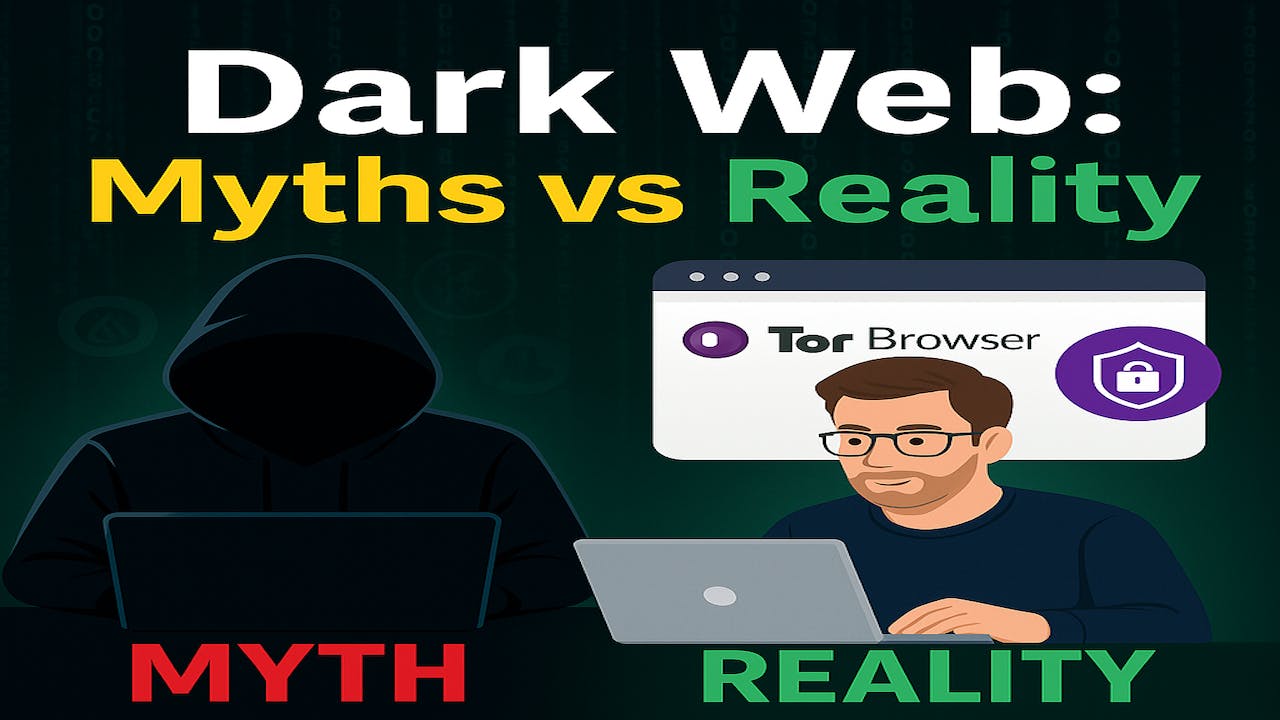When one hears the phrase “dark web”, it usually evokes visions of illicit transactions, hoodie-wearing hackers, and clandestine operations. Yes, some of that does occur, but the dark web is really more complicated and less Hollywood than what films or the news portray.
Here in this blog, let’s get deep into the dark web—what it is, what it isn’t, and debunk myths vs. reality—all in simple, bite-sized language.
What is the Dark Web?
The dark web is a portion of the internet that isn’t searched by engines like Google, Bing, or Yahoo. You need special programs like Tor (The Onion Router) or I2P (Invisible Internet Project) to access it.
Unlike the “surface web” (what most of us use daily), the dark web isn’t directly accessible through normal browsers. It’s part of a broader category known as the deep web, which includes any content that requires a login, like your Gmail inbox or bank account. But the dark web is a smaller, intentionally hidden portion of this deep web.
Myth #1: The Dark Web is 100% Illegal
Reality: Not all on the dark web is criminal.
Yes, the dark web does have illegal marketplaces, stolen information, and other illicit services. But not all of it is criminal. Some websites and communities use the dark web for privacy.
For instance:
-
Whistleblowers provide information without putting their safety at risk.
-
Journalists communicate securely with sources.
-
Citizens in repressive nations get uncensored news and services.
Actually, organizations such as The New York Times, BBC, and ProPublica have mirror sites of their websites on Tor precisely for this reason.
Myth #2: The Dark Web is One Giant Black Market
Reality: Markets do exist, but it’s more than that.
Yes, you can discover illicit marketplaces on the dark web selling weapons, drugs, false IDs, and stolen data. One of the most notorious examples was Silk Road, a dark web marketplace seized by the FBI in 2013.
However, the dark web is also inhabited by:
-
Political discussion forums
-
Privacy-conscious communities
-
Libraries of prohibited books or censored material
-
Tech enthusiasts and security researchers
It’s not only a black market—it’s an entire ecosystem of multiple purposes, good and evil.
Myth #3: You’ll Get Hacked Instantly
Reality: It’s not inherently dangerous—but caution is a must.
The dark web itself will not hack you for visiting it. But yes, it can be dangerous if you’re irresponsible.
Risks include:
If you’re on the dark web, it’s important to:
- Use a VPN + Tor for extra anonymity
- Never download files or share personal information
- Not click random links
- Only use sites with established reputations
Myth #4: You Can Be Totally Anonymous
Reality: Complete anonymity is difficult—but Tor makes it easier.
Tor conceals your IP address by routing your connection through multiple nodes around the globe. This provides you with a degree of anonymity, but it’s not guaranteed.
Governments and skilled attackers have de-anonymized users before through:
If anonymity is your goal, remember:
- Disable JavaScript in your Tor browser
- Don’t log in to any real-world accounts (like Gmail, Facebook)
- Don’t use your real name or identity anywhere
Myth #5: Law Enforcement Can’t Access the Dark Web
Reality: They can—and they do.
While the dark web is anonymous by design, it’s not invisible to law enforcement. Agencies have:
-
Infilitrated marketplaces
-
De-anonymized server locations
-
Located cybercriminals through errors that they committed
-
Utilized advanced traffic analysis tools
The shut down of markets such as AlphaBay, Hansa, and Silk Road illustrates that criminals aren’t safe because they are in the dark web.
So no—the dark web isn’t some lawless wasteland. Police are monitoring it, and people using it to commit crimes can and do get arrested.
Myth #6: The Dark Web is Only for Criminals and Hackers
Reality: It’s a tool, just like any aspect of the internet.
Imagine the dark web as a technology platform—similar to email or social media. It’s up to the user how it’s used.
Though it’s become a haven for cybercriminals, it’s also used:
Most times, individuals use the dark web not to be a criminal, but to escape surveillance, censorship, or data collection from big companies.
Do You Go to the Dark Web?
It depends on why you’re interested.
If you’re merely browsing for knowledge or to know how it functions, that’s okay—as long as you’re safe and ethical.
Safe Browsing Tips:
- Download the official Tor Browser
- Use a VPN before booting up Tor
- Don’t disclose your true identity
- Avoid downloading anything
- Never trust a site blindly—scams happen everywhere
Final Thoughts
The dark web isn’t evil in and of itself, but it’s not totally safe, either. Like any technology, it’s a double-edged sword—capable of both safeguarding freedom and facilitating harm.
If you ever decide to go there, do it with eyes wide open, on your toes, and with a purpose in mind. Don’t believe everything you hear, nor should you act hysterically based upon some myth or urban legend.
The point to take away? The Dark Web is just a tool-in how it gets used is the actor.











